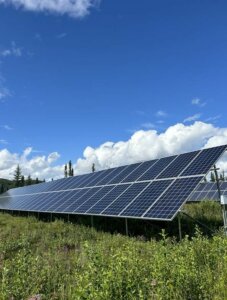By Jolene Malamute, Infrastructure Administrative Assistant III
 In the Tanana Chief Conference (TCC) region, residents face significant challenges related to energy costs and supply. The average cost of electricity is 65 cents per kilowatt-hour (kWh), while the price of diesel fuel exceeds $7 per gallon. Most communities still rely on legacy diesel generators and decades-old power lines to provide electricity to rural villages.
In the Tanana Chief Conference (TCC) region, residents face significant challenges related to energy costs and supply. The average cost of electricity is 65 cents per kilowatt-hour (kWh), while the price of diesel fuel exceeds $7 per gallon. Most communities still rely on legacy diesel generators and decades-old power lines to provide electricity to rural villages.
In the fall of 2022, significant funding was made available through the Infrastructure Investments and Jobs Act (IIJA) under BIL 40101(d). This allocation is available to States and Tribes to prevent power outages and to strengthen and modernize America’s power grid against wildfires, extreme weather, and other natural disasters. TCC worked with nearly a dozen Tribes to apply individually for this non-competitive, allocation-based grant.
In May 2023, an amendment to the funding opportunity allowed Tribes to apply under one application, reducing the administrative burden associated with reporting, project management, and reapplication each year during the five-year funding period. As a result, TCC collaborated with the village of Nulato to assemble a consortium and successfully secured $2 million in funding for the group.
In 2024, this funding was doubled to a total of $5.5 million, bringing the cumulative funding to over $7 million in the past three years. Since TCC is not eligible to apply independently, the Nulato Tribe serves as the applicant while TCC provides technical project management, financial reporting, and budgeting. TCC also facilitates discussions with federal grant officers and assists Tribes in overcoming ongoing challenges during the application process.
Grid resilience project examples include reconductoring and repairing power poles, improving bulk fuel storage, workforce development, utility training, and implementing backup battery storage solutions. It is important to note that there are specific restrictions, such as no new electricity generators or solar panels unless they are replacing old equipment, and no new power lines to subdivisions. All plans are subject to change and require authorization.
The funding requires two sources of cost matching. For their applications, Tribes must provide a 15% cost match on the federal funds received, while sub-awardees (electric utilities) need to provide a one-third cost match on their portion of the subaward if they are small utilities (less than 4 million megawatt-hours of generation).
To further support these projects, TCC has secured $1 million in matching funds from the Denali Commission. However, one of the significant challenges for Tribes has been collaborating with local electric utilities and fuel vendors on potential projects.
Through these initiatives, TCC and its partner Tribes are working to enhance energy resilience, reduce costs, and ensure a more reliable energy future for communities in the TCC region.
